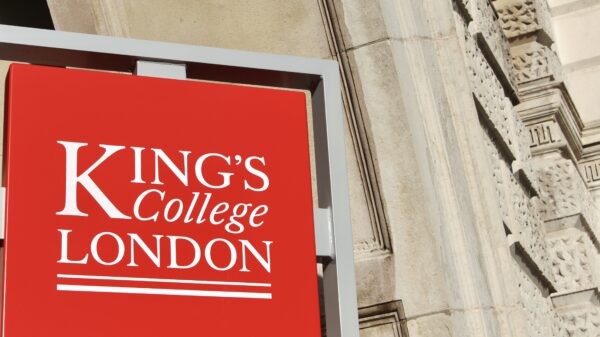On March 13, 2024, the KCL Politics Society hosted the second iteration of its Bi-Annual Political Debate on Strand Campus. Staff Writer Alice Fu reports.
In light of the controversial events of last semester’s debate, the Politics Society hosts, Josh Robinson and Lisa Lefebvre-Risso, emphasised that this debate would be held in accordance with King’s College London Student Union (KCLSU)’s safe space policy. The event would be an “inclusive and supportive space”, to ensure “calm and moderated” political discussion.
The participants of the event were co-chairs from KCL Labour, Nathan Widdowson and Rhiannon Sullivan, KCL Liberal Democrats President Joep Lahaije and Secretary Toby Harvey, and non-KCLCA affiliated conservative students, Charles Hinds and Patrick Schnecker.

During introductions by each party at the beginning of the debate, Charles Hinds announced that neither he nor Patrick Schnecker was now “remotely affiliated with the KCL Conservatives”. To applause from the audience, Hinds stated that “being conservative is not all about berating audience members”, referencing the fallout from KCLCA president Isaac Farnbank’s outburst at a heckler during the previous debate. Schnecker added that he was “not affiliated with the society nor with the party”. Both Hinds and Schnecker represented their individual perspectives on conservative ideology during the debate.
The five pre-agreed topics of debate were the economy, immigration, justice reform and drug policy, foreign affairs, and constitutional and electoral reform. Notable moments included conservative representative Charles Hinds’ and the Liberal Democrats’ agreement on tackling the housing crisis through “reinvigorating the housing market”. Hinds’ proposal to encourage “old people to sell the housing they are owning” through tax reform saw Liberal Democrat Joep Lahaije respond, “for once we agree with the conservatives on that”, remarking that it was “actually quite a liberal standpoint”.
There were also instances where both Labour and conservative representatives strayed from party lines when discussing the topic of immigration. Conservative representative Patrick Schnecker opposed the Rwanda plan for its costs, supported by fellow conservative Charlie Hinds for being “wildly economically impractical” and a “flagrant violation” of international law. Labour co-chair Rhiannon Sullivan proposed to harness immigration to rebuild the National Health Service (NHS), which had been broken by “Tory austerity”. In response to illegal immigration, she stated that the “rhetoric around it needs to be calmer”. The Liberal Democrats jokingly remarked, “it is useful when both speakers do not agree with party lines”, and in response to rising immigration levels, President Joep Lahaije commented, “as a pro-immigration party, even that’s too much”. He demanded reforms around the immigration system and national infrastructure to facilitate the integration of immigrants into the UK.
Major political disagreement emerged between the parties when debating drug policy. The conservatives advocated for greater investment in the criminal justice system, while the Liberal Democrats and Labour called for decriminalisation, evoking cheers of support from audience members. Labour president Nathan Widdowson’s comment that “there’s nothing wrong with going back home after a long day and smoking” led to a lively discussion of the effects of second-hand smoking and the harm principle, with the conservatives calling on comparison with seatbelt laws to argue for government intervention on drugs. The Liberal Democrats called for the decriminalisation of drugs beyond marijuana such as ecstasy, criticising the line drawn between different substances.

The conservatives also dissented heavily with the views of Labour and the Liberal Democrats when discussing the ongoing crisis in Gaza. The Liberal Democrats declared, “we cannot talk about foreign affairs without talking about Gaza”, and labelled the conflict as the “number one” humanitarian problem occurring across the world in the present. Labour representatives agreed, labelling the crisis as “textbook ethnic cleansing”, and demanded an end to the conflict beyond ceasefire through the recognition of the state of Palestine.
Contrastingly, conservative representative Patrick Schnecker drew attention to the October 7th attack by Hamas and reiterated that “the Conservatives have taken the same stance (in the Israeli-Palestinian conflict) as in Ukraine”. He claimed that a ceasefire would be insufficient in ending the control of Hamas in the Gaza Strip while stressing the importance of streamlining humanitarian aid to both Israeli and Palestinian civilians. An audience member criticised his views as contradictory during the Q&A, asking if Palestinians “can get bombed in the day and humanitarian aid from the planes at night”. Schnecker rejected this characterisation and expressed that he was “not looking for the death of the Palestinian people”. He clarified that humanitarian aid would not reach the civilians if Hamas remained in power. In response to the UK’s funding of arms to Israel, Schnecker emphasised the importance of supporting Israel as an ally in foreign affairs.

On constitutional reform, the Liberal Democrats advocated a “radical” programme, advocating proportional representation to break the “duopoly” of the first-past-the-post (FPTP) elections, as well as the abolition of the House of Lords. Conservative Charles Hinds pointed out the importance of local representation in FPTP and defended the House of Lords as a source of “security and stability”, such as in its opposition to the Rwanda Bill. Labour advocated a middle ground of “reform” to the chamber. Labour also focused on greater devolution as key to Britain’s future, with conservatives agreeing on the importance of devolution but raising concerns about the dangers for the Union of devolution done badly.
With the conclusion of all five segments of discussion, the event ended with an audience poll on which party had won the political debate. The independently affiliated Conservative students won with 40 votes, followed by the KCL Liberal Democrats with 38 votes and KCL Labour with 31 votes.


















